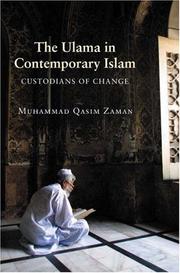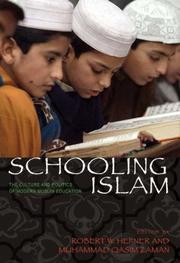| Listing 1 - 2 of 2 |
Sort by
|

ISBN: 1282964682 9786612964688 1400837510 9781400837519 0691096805 9780691096803 9780691130705 0691130701 9781282964686 6612964685 Year: 2002 Publisher: Princeton: Princeton university press,
Abstract | Keywords | Export | Availability | Bookmark
 Loading...
Loading...Choose an application
- Reference Manager
- EndNote
- RefWorks (Direct export to RefWorks)
From the cleric-led Iranian revolution to the rise of the Taliban in Afghanistan, many people have been surprised by what they see as the modern reemergence of an antimodern phenomenon. This book helps account for the increasingly visible public role of traditionally educated Muslim religious scholars (the `ulama) across contemporary Muslim societies. Muhammad Qasim Zaman describes the transformations the centuries-old culture and tradition of the `ulama have undergone in the modern era--transformations that underlie the new religious and political activism of these scholars. In doing so, it provides a new foundation for the comparative study of Islam, politics, and religious change in the contemporary world. While focusing primarily on Pakistan, Zaman takes a broad approach that considers the Taliban and the `ulama of Iran, Egypt, Saudi Arabia, India, and the southern Philippines. He shows how their religious and political discourses have evolved in often unexpected but mutually reinforcing ways to redefine and enlarge the roles the `ulama play in society. Their discourses are informed by a longstanding religious tradition, of which they see themselves as the custodians. But these discourses are equally shaped by--and contribute in significant ways to--contemporary debates in the Muslim public sphere. This book offers the first sustained comparative perspective on the `ulama and their increasingly crucial religious and political activism. It shows how issues of religious authority are debated in contemporary Islam, how Islamic law and tradition are continuously negotiated in a rapidly changing world, and how the `ulama both react to and shape larger Islamic social trends. Introducing previously unexamined facets of religious and political thought in modern Islam, it clarifies the complex processes of religious change unfolding in the contemporary Muslim world and goes a long way toward explaining their vast social and political ramifications.
Muslim scholars. --- Ulama. --- Islamic scholars --- Scholars, Muslim --- Scholars --- Ulema --- Islam --- Muslim scholars --- Functionaries --- Ulama --- #SBIB:316.331H421 --- #SBIB:39A10 --- Morfologie van de godsdiensten: Islam --- Antropologie: religie, riten, magie, hekserij --- Islam and politics. --- Ulémas --- Islam et politique --- Political sociology --- Middle East

ISBN: 1400837456 9786612964664 1282964666 9781400837458 9780691129327 0691129320 9780691129334 0691129339 6612964669 9781282964662 Year: 2007 Publisher: Princeton: Princeton university press,
Abstract | Keywords | Export | Availability | Bookmark
 Loading...
Loading...Choose an application
- Reference Manager
- EndNote
- RefWorks (Direct export to RefWorks)
Since the Taliban seized Kabul in 1996, the public has grappled with the relationship between Islamic education and radical Islam. Media reports tend to paint madrasas--religious schools dedicated to Islamic learning--as medieval institutions opposed to all that is Western and as breeding grounds for terrorists. Others have claimed that without reforms, Islam and the West are doomed to a clash of civilizations. Robert Hefner and Muhammad Qasim Zaman bring together eleven internationally renowned scholars to examine the varieties of modern Muslim education and their implications for national and global politics. The contributors provide new insights into Muslim culture and politics in countries as different as Morocco, Egypt, Pakistan, India, Indonesia, Iran, and Saudi Arabia. They demonstrate that Islamic education is neither timelessly traditional nor medieval, but rather complex, evolving, and diverse in its institutions and practices. They reveal that a struggle for hearts and minds in Muslim lands started long before the Western media discovered madrasas, and that Islamic schools remain on its front line. Schooling Islam is the most comprehensive work available in any language on madrasas and Islamic education.
Comparative education. --- Religion and culture. --- Religion and politics. --- Islam and politics. --- Madrasahs. --- Islamic religious education. --- Education, Comparative --- Education --- Culture and religion --- Culture --- Political science --- Politics, Practical --- Politics and religion --- Religion --- Religions --- Islam --- Politics and Islam --- Madrasas --- Madrasehs --- Madrassahs --- Madrassas --- Medreses --- Medressehs --- Islamic religious education --- Schools --- Muslims --- Muslim religious education --- Religious education, Islamic --- Islamic education --- Religious education --- History --- Religious aspects --- Political aspects --- Education religieuse islamique --- Madrasa --- Islam et politique --- Religion et politique --- Religion et culture --- Education comparée --- Madrasahs --- Islam and politics --- Religion and politics --- Religion and culture --- Comparative education
| Listing 1 - 2 of 2 |
Sort by
|

 Search
Search Feedback
Feedback About UniCat
About UniCat  Help
Help News
News